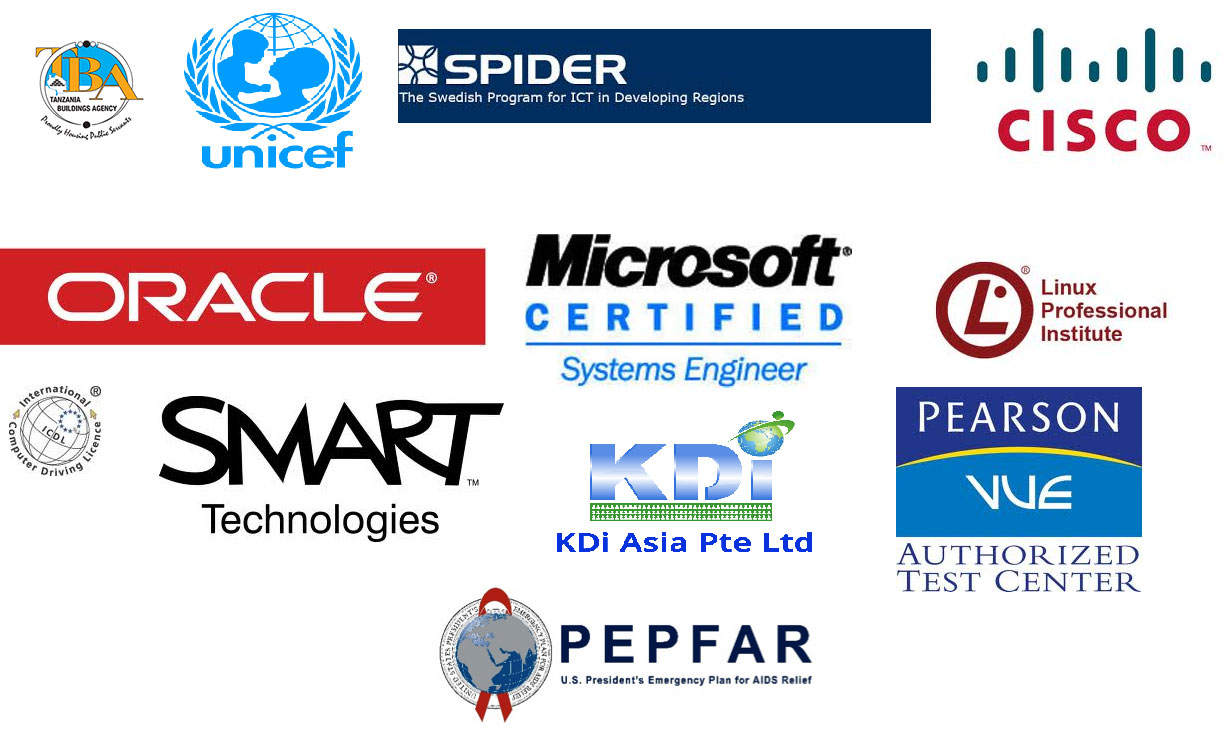Partners

The University of Dar es Salaam Computing Center(UCC) is involved in a number of initiatives at both national and international level to promote the use of ICT for development and develop applications in that line. In some of these initiavtives UCC participates as an independent entity but the company sometimes serves as a shareholder with the University of Dar-Es-Salaam in many projects.
Who have we rubbed shoulders with?
Sida/SAREC:UCC and Sida/SAREC engaged in a partnership that was very beneficial to the company. Initial collaborations afforded academic capacity building for all UCC members of staff. Other relations with Sida/SAREC lead to Information and Communication Technology (ICT) infrastructure development at UCC. The partnership between UCC and Sida/SAREC was also very instrumental in pioneering E-learning development at UCC.
DELFT University: UCC has also enjoyed close friendship ties with other institutions such as DELFT University which have resulted in ICT professional development for staff members and UCC infrastructure development through MHO project.
Carnegie Foundation of New York:As a result of UCC's partnership with the renowned Carnegie Foundation of New York the company has received great support that has resulted in University of Dar-Es_Salaam Network Security enhancement. The Carnegie Foundation of New York also greatly supported institutionalisation of academic registration information system (ARIS) at the University of Dar-Es-Salaam.
AVOIR: UCC has taken giant strides by forming partnership with the African Virtual Open Initiative and Resources' (AVOIR) team which specialises in developing open source software and or Learning Management Systems (LMS). This project is about harnessing the enormous potential that exists within Africa and the African diaspora to create a core of developers of free software who are able, through software development activities, to create educational and business opportunities that contribute to development on the continent.
IICD Capacity Development Programme in Tanzania: IICD is implementing Country Programme in some developing countries to enhance the institutional capacity of the local partners to identify and develop ICT sector policy plans, implement pilot projects, and to further develop their own capacities. The main goal for IICD together with his partners in Tanzania is to make the programmes in the Education, Good Governance, Livelihoods and Health sectors sustainable. The NTPs of IICD in Tanzania have been very instrumental in providing institutional management and technical skills training, tailored to the needs of the Tanzanian project partners. One of the NTPs in Tanzania is University of Dar es Salaam Computing Centre (UCC).
Tanzania Free and Open Source Software Association (TAFOSSA): The mandate of TAFOSSA dates back on 4th February, 2004 when the participants of the Seminar on Free and Open Source organized jointly by the University of Dar es Salaam Computing Centre (UCC),The International Institute for Communication and Development (IICD) and COSTECH unanimously adopted a resolution to establish a national umbrella organization with general objective of harnessing the potentials of free and open source software for supporting national developmental goals as spelled in Tanzania's National Vision 2025 and reiterated in Tanzania's National Information and Communication Technologies (ICT) Policy of 2003.
Information Technology in African Business (it@ab) network: UCC is a member of it@ab network. it@ab (Information Technology in African Business), is the Southern African Knowledge Network on "Information Technology in African Business". It was founded 2001 in order to support the participation of Small and Medium Sized Companies, Institutions and Governmental Bodies in the global knowledge-based economy through e-commerce, e-business developments and ICT consulting and training. it@ab was established with financial and technical support from InWEnt (Capacity Building International, Germany). The network has more than 30 distinguished multiplier institutions in seven SADC member states. it@ab consists of Universities, Consulting companies, IT-Training Institutions, Internet Providers, Applications Service Providers and Trade Promotion Organizations in Angola, Malawi, Mozambique, Namibia, South Africa, Tanzania and Zambia. The number of members is still growing.

